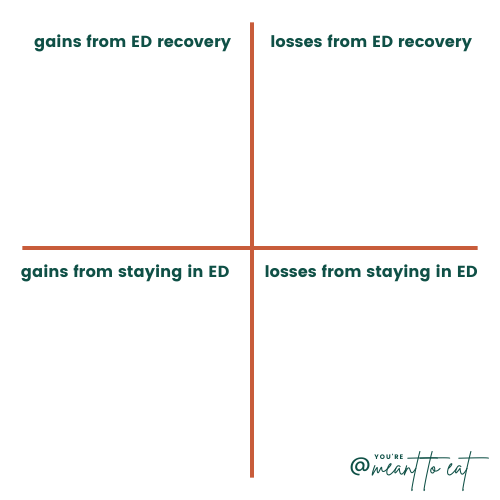recovery costs (literally & emotionally)

May 13, 2023
Let it be known that what prompted me to start this blog post was a lawnscaping business card delicately placed in between our mail box and the flag thingy. No other mail box on our street that I could see had one. Is this passive aggressive or aggressive aggressive LMK. Generally the lawn is all my husband’s. But tonight, there was just this “this lawn is costing too much at this point, let’s hire someone to cut it and treat the weeds this week.” It will cost us about $100 bucks to mow the lawn, but we don’t just get a nice and neat lawn from this deal. We get a break in our to-do list, some mental space back, a few hours of our time, AND more quality time together, ect ect. All this being said, sometimes we perceive something to cost so much up front that we try *everything* to get by or get around it. That usually ends up being more expensive (literally and emotionally).
Clothing.
Literal.
Clothes cost money. Generally, I like to approach clothing with a cost per wear philosophy. It makes sense for me to invest in a pair of quality made jeans that fit comfortability that I feel confident in because 1) I am more likely to wear them and 2) my experience wearing them is more neutral / fun / confident. When I try to go too bargain route, I typically resent the jeans for how they fit and feel and they end up wadded up at the bottom on my drawer. The $150 Madewell jeans cost me <$1 per wear in a year and the $30 pair from Target cost me about $15 per wear.
Emotionally.
Back when my body was more rapidly changing in recovery, I felt *so* resistant to buying new clothes. My brain felt like admitting I needed a larger size, facing shopping and dressing rooms, and having a body-focused experience felt like it cost so so much. My brain perceived that buying new clothes would cost me my peace, happiness, quietness, stillness. And short-term, buying clothes that fit my there-and-then body did cost me some of those things. However (and that’s a big however), in avoidance I found that the cost was greater. Because every time I felt my belly suffocated or my thighs constricted or my hips smushed, I would be filled with real heavy feelings. So in my attempt to protect myself, I ended up costing myself more. This is where the RO-DBT concept of being effective vs. being right comes in!
Nourishing in Recovery.
Literal.
Once my clients get to a certain point in their recovery, they’ll say “omg it costs so much to eat normally.” Yes!!!!!!! I mean if you are restricting it will take quite some time to habituate to a normal amount of money to spend on food per week. Another conversation I’ll have with clients is eating out vs. eating in. It can be REAL hard in ED recovery to not just plan a meal, but purchase the ingredients, cook the meal, plate the meal, eat the meal, and not engage in compensatory behaviors. So, yes, while take out may cost more than a meal at home the value of nourishing despite urges to not may very much be worth the cost of that meal out.
Emotionally.
When making a decision, we look at cost AND benefit. Most of my work with clients is to build awareness and develop insight around the value of recovery. There’s a lot restriction can’t give you that a full recovery can. I will usually have them engage in the activity below, journaling out perceived and / or actual gains and losses from staying in their ED and from eating disorder recovery.
Exercise.
Literally.
Working out a body overcoming an eating disorder is like asking a car with bald tires and no bluetooth to take you on a road trip. Like maybe, maaaaybe you could get somewhere, but not for long, not safely, and not with fun. Sounds like an awful roadtrip. But truly, the cost of exercise on a malnourished body costs you heart tissue, kidney function, bone density, healthy hormones, and your mental health. That is not an exaggeration. While diet or wellness culture may try to convince you that eating less and moving more will be well worth the cost, you cannot buy stronger hips at age 80 and you cannot purchase a strong heart.
Emotionally.
Working on your relationship with exercise is like investing. Short term, there is a huge cost and the reward comes so, so much later. It would feel much better to have instant access to all the cash for traveling or shopping or fun events. However, you invest anyway for the hope of a more fulfilling and easier-going future. Compulsive exercise will convince you emotionally that you *cannot* pass up the offer to MOVE NOW !!! And that’s the thing about compulsive exercise, it’s a classic sales guy (maybe like the one who sold you the car with bald tires and a crappy entertainment center) who uses the same ol’ cliche gimmicks. What if you learned your compulsive exercise sales guy’s gimmicks so well you could name those intrusive exercise thoughts as just that vs. believing the sales tricks and acting on them?
Disclaimer: As I am discussing costs and money, I want to acknowledge my privilege and ability to buy new clothes, eat out, afford ED treatment. I know these things are not accessible to all. There are very real barriers and very real too high of costs that prevent many from full recovery.

I’m literally in tears because I needed this blog so much. Trying to recover with no team and a PCP with no ED experience is …. well you know. This was priceless info for me …. along with many of your other posts here. Thank you.
<3 <3 <3 <3